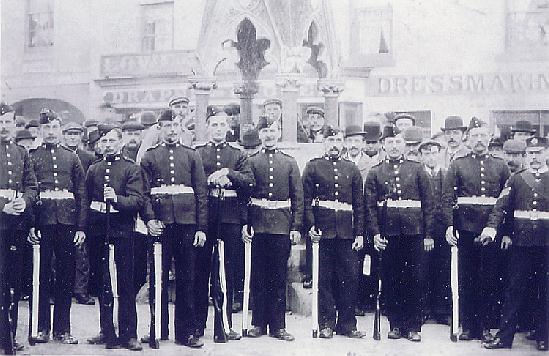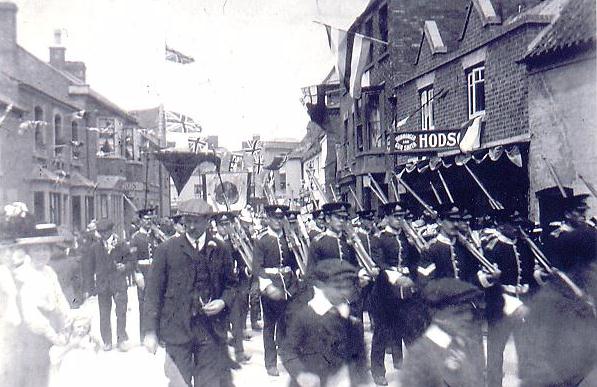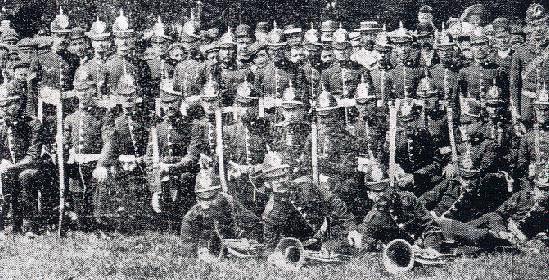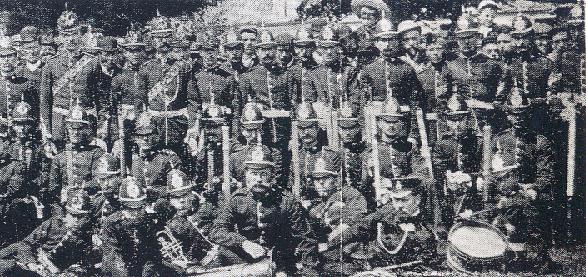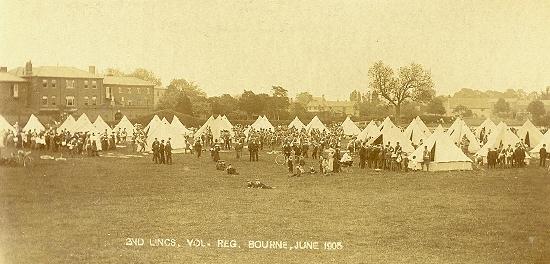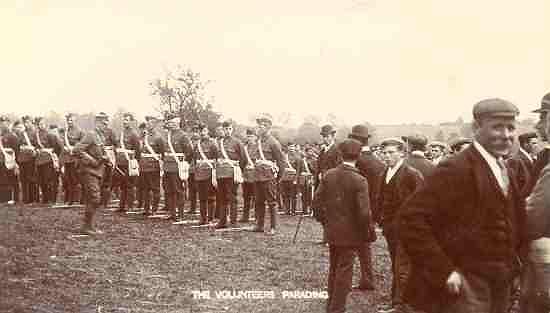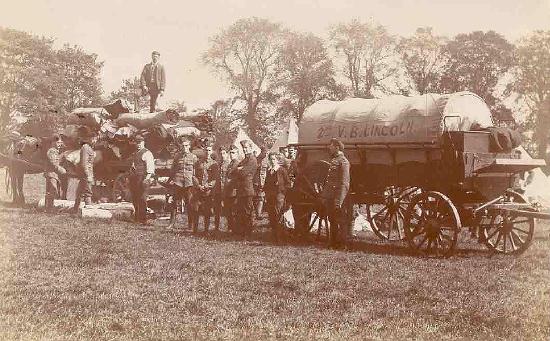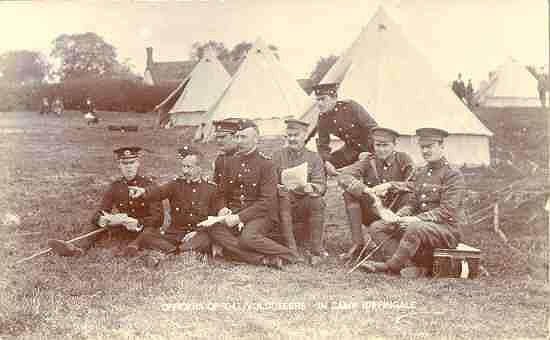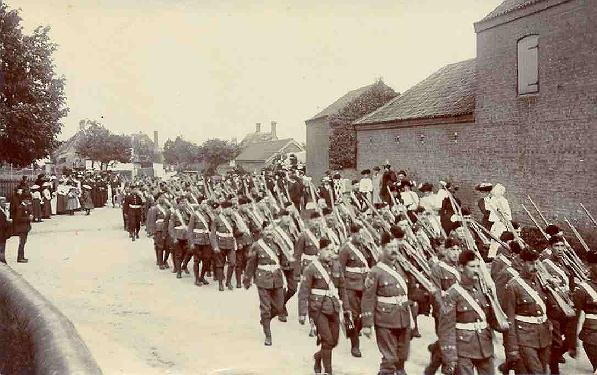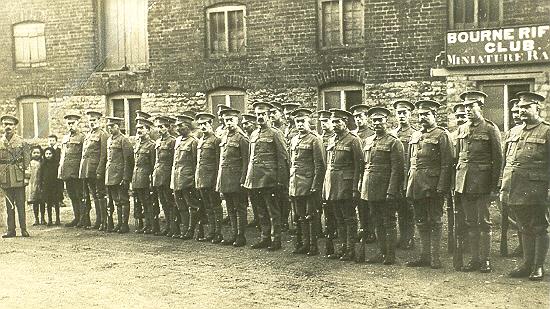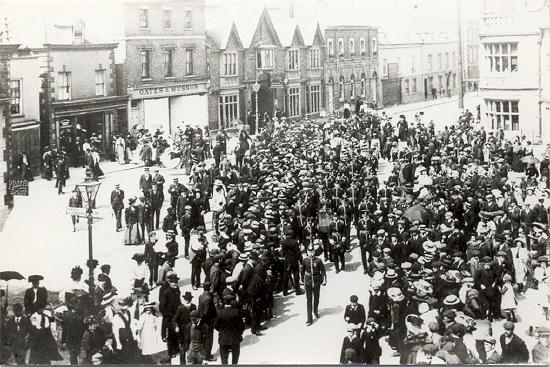|
The Bourne Volunteers
Bourne Volunteers pictured in the Market Place circa 1880
There has been an intermittent military presence in Bourne for the past 300 years, the most famous being the volunteer yeomanry troop known as the Light Horse Rangers. This unit was recruited by a local businessman, Thomas Rawnsley, from among local residents in the early part of the 19th century when Britain was at war with revolutionary France, for national defence against a possible invasion threatened by Napoleon. The volunteers practised military drill regularly on common land in the town while the emergency lasted but had no chance to display their valour because the invasion never came.
By 1816, all volunteer units in Britain had been disbanded but between 1848 and 1859, distrust of France as the dominant continental power, and the Duke of Wellington's warnings about the weakness of the regular forces, gave rise to a volunteer movement among the more prosperous middle class who formed numerous rifle volunteer corps, most of which were grudgingly recognised by the government. From 1859 until 1863, the War Office paid more attention to the movement and the various corps were formed into battalions for administrative purposes. Many corps dating from this period still survive as units of the Territorial Army.
In Bourne, the national movement for the recruitment of volunteers arrived in March 1860 amid an atmosphere of jingoism when the War Office accepted the formation of No 15 Corps of the Lincolnshire Rifle Volunteers and Lord Willoughby provided a piece of land between Bourne and Edenham for rifle practice after it had been visited and approved by a government inspector. Drill was practiced in a large room in South Street provided by Mr Thomas Mawby who then owned the riverside factory premises adjoining his home at The Cedars, now Bourne Eau House, and Sergeant Lemmon was drafted in to teach the recruits military drill.
The formal inauguration of the unit took place on Wednesday 25th July 1860 when the town observed a public holiday and tradesmen closed their shops. Members of the corps assembled in the Market Place in their new uniforms and then, accompanied by the South Lincoln Militia band, marched to the Abbey Church for a special service to mark the occasion and hear a sermon preached by the vicar and honorary chaplain, the Rev Joseph Dodsworth. He took for his text the 8th verse of Psalm 33 and spoke of the Christian duties of those connected with what he called "this great national movement". He made allusions to the quarrels among nations and said it was impossible to tell how soon an attempt might be made to invade our own shores and added: "God is the source of all our strength and we are not to neglect or avail ourselves of all legitimate means within our reach for the defence of the country." After the service, the volunteers, accompanied by crowds of sightseers, paraded through the town to a field adjoining the cemetery owned by Mr Thomas Osborn where there was a review and displays of weapons and drill. A silver bugle, bought with subscriptions collected by the ladies of the town, was then officially presented to the corps as a gesture of their support for "this noble movement for our national defence."
The celebrations culminated with a dinner at the Town Hall which began at 4 pm and was attended by members of the corps and fifty guests, although this appears to have been more an excuse for a merry party rather than the formation of a military unit. The meal was served by Mr Henry Bott, landlord of the Angel Hotel, and his staff, and the jollity of the occasion was captured by a reporter from the Stamford Mercury who described the all-male event as follows:
The bill of fare included every delicacy of the season and the wines were of first rate quality. The customary and preliminary toasts were proposed from the chair which was occupied by Captain J C Lawrance. Captain C Parker responded for "the Army and Navy" and the Rev G W Keightley of Dunsby for "the Bishop and Clergy". Mr G J Nicholls proposed "the 15th Lincolnshire Rifle Corps" which was acknowledged by the Captain. In connection with the toast, a high compliment was paid to Sergeant Lemmon, drill instructor. The health of "the Ladies" was proposed by Captain Parker and replied to by Mr H D Dove. The health of "the Lord Lieutenant of the county" was given from the chair and enthusiastically responded to by the company. Mr S W Andrews gave "the Commissioned Officers", which was responded to by Mr Hardwicke (the Lieutenant) and Mr Pawlett, the Ensign of the corps. Mr Thomas Gleed proposed "the Non-Commissioned Officers" to which Sergeant Harrison replied. The "Honorary Members" and the "Honorary Secretary" were proposed from the chair and responded to by Mr S W Andrews. The health of "the Honorary Chaplain" was proposed by Lieutenant Hardwicke and replied to by the Rev J Dodsworth. "The Honorary Surgeon" was proposed by Ensign Pawlett and Dr Hardwicke replied. Captain Smith (of the 17th Lincolnshire) replied to the health of "the Strangers". The health of Mr Thomas Osborn, for the use of his field for the review, was next proposed and responded to by him. The motto hung up in the room, in large letters, was "Resolute to repel" and if we may judge by the many patriotic and enthusiastic speeches made on this occasion, there is every reason to suppose that strenuous efforts will not be wanting to keep up and increase the efficiency of the corps.
Conviviality of this kind appeared to be a regular occurrence whenever there was a parade although the serious business of military training always came first as was reported by the Stamford Mercury on Friday 31st May 1867: The 2nd battalion of the Lincolnshire Rifle Volunteers, to the number of 300, comprising the Grantham, Spalding, Holbeach, Stamford, Folkingham, Sleaford and Bourne corps, assembled at Bourne on Wednesday last for their second battalion drill this season, under Lieut-Colonel Sir John Thorold. There were two parades, the first at 10 o'clock, headed by the Bourne Rifle Corps band, when the volunteers marched to a field in West-road, kindly lent for the occasion by Mr Robert Mawby, jun. At about half past 12, the corps was dismissed for one hour and a half. At 1.45, the battalion was again complete and after about an hour and a half's further good work (which was cut short by a heavy shower), the volunteers were thanked by the Colonel for their attention and for the good muster present. Some of the corps after the first drill, and others after the second, partook of luncheon together at the Angel Hotel, provided in Mr Bott's usual liberal style. The weather was very fine until the close, and there was a large number of spectators on the ground. The volunteers were a loyal and dedicated group, as illustrated by these reports on the deaths of two colleague from the Stamford Mercury;
On Saturday last, a portion of the Rifle Corps and a large concourse of people attended the funeral of Mr Joseph Frost at the Bourne cemetery. Deceased belonged to the Rifle Corps band and was an officer of the Inland Revenue residing in Bourne. As an obliging public officer, he was generally respected by those with whom his occupation brought him into contact. The Rifle Corps band accompanied the procession, playing the Dead March in Saul. The funeral service was performed by the Rev Joseph Dodsworth, the Vicar, and honorary chaplain to the corps; and at the close, 12 of the volunteers fired three volleys over the grave. - Friday 6th March 1868.
On Sunday last, the remains of Private Robert Tinsley Sutton, landlord of the Royal Oak Inn, Haconby, near Bourne, were interred with military honours in the churchyard of that parish. He had been for several years a member of the 15th Lincolnshire Rifle Corps and the funeral being appointed to take place at 2 o'clock, nearly the whole of the members were present and proceeded to the house of the deceased and thence to the church in the following order: the band playing "Dead March", the firing party with arms reversed, the corpse and the mourners, the rear being brought up by the remaining members of the corps. The Rev Walter Stockdale, the Vicar of Haconby, read the service and the church was nearly filled by a large congregation. At the close of the service, three volleys were fired over the grave and the corps returned, the band playing "Brief life is here our portion". - Friday 11th November 1870.
The 15th Lincolnshire Rifle Volunteers lasted for thirteen years without being called upon for national duty or even firing a shot in anger and was disbanded in 1873 because of a shortage of officers. The situation was outlined to the men when they paraded at Bourne on Saturday 26th October 1872 for their annual inspection by a visiting officer from regimental headquarters in Lincoln, Lieutenant-Colonel Wilkinson. Those present included one officer, two sergeants and 36 rank and file. There was an inspection, salute and march past and before the men were dismissed, the colonel told them that the unit was under threat because the current commanding officer held a major's commission in the militia and was therefore resigning his captaincy of the corps. He added: "The unit is now likely to fall to the ground for want of officers. This is to be regretted because you are a fine body of men, smart and soldierly in appearance with many excellent shots among you. I hope that there can be found some gentleman in the neighbourhood who will come forward and rescue the corps from the collapse that threatens it." This did not happen and the unit folded the following year. A meeting at the Angel Hotel on 31st January 1873, under the chairmanship of Mr J C Lawrance, was told that there was no scarcity of men or means but officers were needed to save the corps from collapse. In particular, Major Parker was resigning as commanding officer and no other gentleman could be found to accept the appointment. An approach had been made to William Pochin, Lord of Manor of Bourne Abbots, who had formerly held a commission in the army, to take over command but he had declined. The meeting therefore decided that there was no alternative but to wind up the unit and release the men from their present engagements, although the majority were expected to sign on with other units in Lincolnshire. This was a major setback for military training in Bourne but by 1885, another unit had been established, H Company, 2nd Battalion, Lincolnshire Volunteer Regiment. Among the commanding officers was Alexander Farr, a solicitor, who was gazetted lieutenant in July 1890 but he resigned in 1892 and for a while, the unit again foundered because it was without any officers. Then in 1895, Cecil Bell, also a solicitor, and Thomas Mays, a businessman and father of Raymond Mays, were gazetted as second lieutenants to take charge of the unit. Bell was later promoted to captain, then major, and Mays eventually became a captain. Within a few weeks, the company had 94 recruits and efforts were being made to raise the strength to 100. In February 1896, Lieutenant Bell said in an interview with the Stamford Mercury: "I must stress that the government grant we get is quite insufficient to meet our expenses and therefore a debt exists at a time when we are trying to provide a new ammunition store. I would like to remind the public that the volunteer force renders conscription unnecessary and that it saves the taxpayer the burden of maintaining a larger standing army. I urge all employers to encourage their men to enrol and to give them facilities for attending drills." The two officers were so enthusiastic about their work that in February 1896, they persuaded the entire membership of the Bourne Town Band to enrol in H Company and thenceforth, it became known as the Volunteer Company Band with their conductor, Mr F J Clarke, being appointed bandmaster. This gave the unit an added impetus, especially for recruiting purposes, and the band was frequently called out to parade through the town on special occasions. But the band did not last and by 1905 it had dispersed because of lack of support but in May 1906, another was formed, this time a bugle band consisting of six bugles, three side drums and a big drum. Money problems persisted but were always overcome by various fund-raising activities that were held to meet the bills and in 1899, the unit managed to buy its own Drill Hall in North Street. Typical of these events was a dance at the Corn Exchange on Thursday 16th February 1899, organised by NCOs and commissioned officers of H Company, with music supplied by Mr J H Berry's string band, and on Wednesday 21st June 1899, the unit took over the grounds of Cavalry House in South Street for another function when the Stamford Mercury reported: The Abbott's Garden, which forms the picturesque grounds of Cavalry House, was, through the generosity of Mr Albert Dainty, thrown open for a promenade concert in aid of the funds of the Volunteer Corps. Art came to the aid of Nature and the illuminations of the garden by the 600 fairy lanterns, artistically arranged by Mr Alfred Stubley, formed an idyllic scene. There was a large company present and all heartily appreciated Mr Dainty's generosity. Dancing was indulged in to the excellent music of the Volunteer Band under Lieutenant Clarke's conductorship. The band has recently been augmented by musicians from Billingborough and it is hoped that it will still be further increased by instrumentalists from Deeping. The proceeds were devoted to the fund for the reduction of the Corps' debt. The Government grant for the Volunteers is quite inadequate to carry on the work of the company in so scattered a district. New stores of ammunition have had to be provided, undress tunics, new and improved equipment, and the thorough re-modelling of the range for use with the Lee-Matford rifle. These items represent about £100 and an earnest appeal has been made to clear this off.
H Company thrived for almost 20 years and several soldiers from the unit sailed for South Africa to serve in the Boer War of 1899-1902 while others volunteered for service at the outbreak of the Great War in 1914. This brought a fresh impetus for military training and a new Bourne Volunteer Training Corps was formed at a public meeting held at the Corn Exchange on Monday 11th January 1915, a forerunner of the Home Guard that was established during the Second World War more than a quarter of a century later. Lord Kesteven presided with members of the local councils and other civic dignitaries on the platform. Volunteer Corps were being formed all over Britain at that time under the auspices of a Central Association who sent a representative, Mr Douglas Knocker, to address the meeting and to outline the aims and requirements of the new organisation. He told the audience: All those below and above the military age are eligible to become members but those of enlisting age for the regular army are not eligible unless there is a good and sufficient reason for their not joining the regular forces. Special constables are eligible unless the Chief Constable of the county objects although I consider it an advantage to the special constables to have the training that they would get by becoming members of the corps. There is no government grant towards the cost of equipment and each member of the corps will have to provide his own rifle, or have it provided for him through the association. Badges will be provided and in case of invasion, each member will be supplied with an armlet attached to the coat. The mood of the meeting was overwhelmingly patriotic and one senior citizen, Alderman A W Dean, who proposed a vote of thanks to the speaker, said: "Nothing will give me greater pleasure than to purchase a rifle and become a member of the corps" although there is no record of him having carried out his promise. Lord Kesteven also offered the corps two rifles and in the early days, equipment was indeed short but soon most of the men were armed and in khaki and operating as an efficient military unit.
The rifle range at Edenham, established in 1860 on land provided by Lord Willoughby, had fallen into disuse and was given a new lease of life and re-opened on Monday 6th August 1917 for shooting practice by the volunteers. Corps members had spent several weeks banking up the earth where it had fallen away as the result of rabbits burrowing through and after it had been put in good order, firing recommenced and continued regularly for the remainder of the war years. Each of the volunteers was required to qualify in rifle proficiency, usually by undergoing special courses on Tuesday evenings and Sunday mornings, with a minimum of ten drills each months, and firing at least fifteen rounds at each session with official reports being compiled by the officers on their progress on the 7th of each month.
By this time, the Drill Hall in North Street had been sold and so a headquarters was established at the miniature rifle range that had been established by the Bourne Rifle Club at premises adjoining the Bourne Institute in West Street which was also used for training sessions and firing practice. At the same time, Lieutenant Mays was promoted to captain and appointed commandant of the new unit. Bourne was also used as a drill station in 1914 for A Squadron, the Lincolnshire Yeomanry and for F Company of the 4th Battalion, the Lincolnshire Regiment. During the Second World War, the 4th Bourne and Stamford Battalion, the Lincolnshire Regiment of the Home Guard was raised and based here from 1940 but the unit was re-designated in 1941 as the 4th Kesteven Battalion of the Lincolnshire Regiment which remained active until stood down at the end of 1944 and there has been no military unit in Bourne since.
See also The Lincolnshire Regiment Unknown soldiers Cecil Walker Bell William Hall and Ernest Spridgeon The Drill Hall The War Memorial The Home Guard Cavalry House Bourne Rifle Range Letters from the Boer War Letters from the trenches Go to: Main Index Villages Index
|
